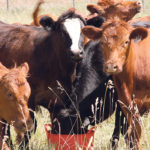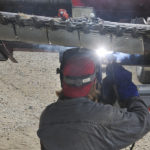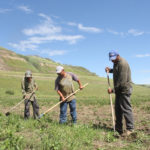Sask. premier outlines what his province is already doing, while territorial leaders urge southern provinces to do more
SASKATOON — Provincial challenges of the federal carbon tax notwithstanding, Canada’s premiers say climate change is a real threat and timely action to reduce greenhouse gas emissions is important. But they want the ability to deal with that threat regionally. “Premiers agreed that provinces and territories must retain the ability to design climate change plans […] Read moreStories by Karen Briere

Bees intrigued show visitors
Leafcutter bees were perhaps one of the more unusual purchases at this year’s Canada’s Farm Progress Show. The Backyard Pollinator intrigued many. “There’s a need for pollinators in people’s back yards,” said Jed Williams, who sells the bees. “There’s a feel-good about having bees in your yard at the current time because there’s a lot […] Read more

Premiers look to reduce internal trade barriers
SASKATOON — Alberta was the first to move, eliminating half of its exceptions to the Canadian Free Trade Agreement, after premiers last week committed to improve internal trade. Procurement by several Alberta agencies, including the purchase of local food under the Supporting Alberta’s Local Food Sector Act, is no longer restricted. “Since when are Alberta […] Read more

Canola meal an option when other feed scarce
Protein supplementation is relevant in a drought year or during dormant season grazing, particularly on native forage
MOOSE JAW, Sask. — Cattle producers struggling to deliver proper protein in dry conditions and with poor feed sources could consider supplementing with canola meal, says a University of Saskatchewan professor. Dr. Greg Penner said a study funded by both industry and the federal government compared feeding heifers canola meal and dry distillers grain as […] Read moreCash advance money three weeks behind
Money from the Advance Payments Program has been slow to make its way into farmers’ hands this spring. Delays in getting everything in place since increased limits were announced have caused a three-week backlog in processing applications. Dave Gallant, director of operations at the Canadian Canola Growers Association, one of the federal government’s agents for […] Read more
Farmers want ministers to make program progress
Business risk management programs should be the priority when Canada’s agriculture ministers gather in Quebec City next week, says the AgGrowth Coalition. The coalition, which includes the country’s major grain and general farm organizations, has announced a four-point plan to improve BRM programs. Co-chair Jeff Nielsen, who also heads Grain Growers of Canada, said coalition […] Read more

Labour shortages costly for farmers
OTTAWA — Labour vacancies cost Canadian farmers in 2018 nearly double what they cost four years earlier, according to research released last week by the Canadian Agricultural Human Resource Council. The Labour Market Forecast found that 16,500 jobs went unfilled, costing $2.9 billion in lost revenue, or 4.7 percent of product sales. Previous work pegged […] Read more

Foreign worker changes surprise industry
Occupation-specific work permits proposed by the federal government concern the Agriculture Labour Task Force
OTTAWA — The notice in the Canada Gazette caught Mark Chambers, and others, off guard. On June 21, the federal government gave notice in the official government publication of a 30-day consultation for possible changes to the Temporary Foreign Worker Program, including occupation-specific work permits. Chambers, co-chair of the Agriculture Labour Task Force, said he […] Read moreAnimal hoarding issue requires varied approach to issue
Animal hoarding problems can be curbed only by looking at needs of both animals and humans, says an expert in the field. Dr. Christiana Bratiotis from the University of British Columbia says animal hoarding is poorly understood. She said in rural North America the predominant type of hoarding involves livestock and that presents different challenges […] Read more
Workers unaware of ag job benefits
OTTAWA — Agriculture has to do a better job of enticing people to work in the industry and should be recruiting people at a younger age if it wants Canadians to fill the roles, says a Conference Board of Canada economist. But it’s more likely that temporary foreign workers and immigrants will have to take […] Read more





